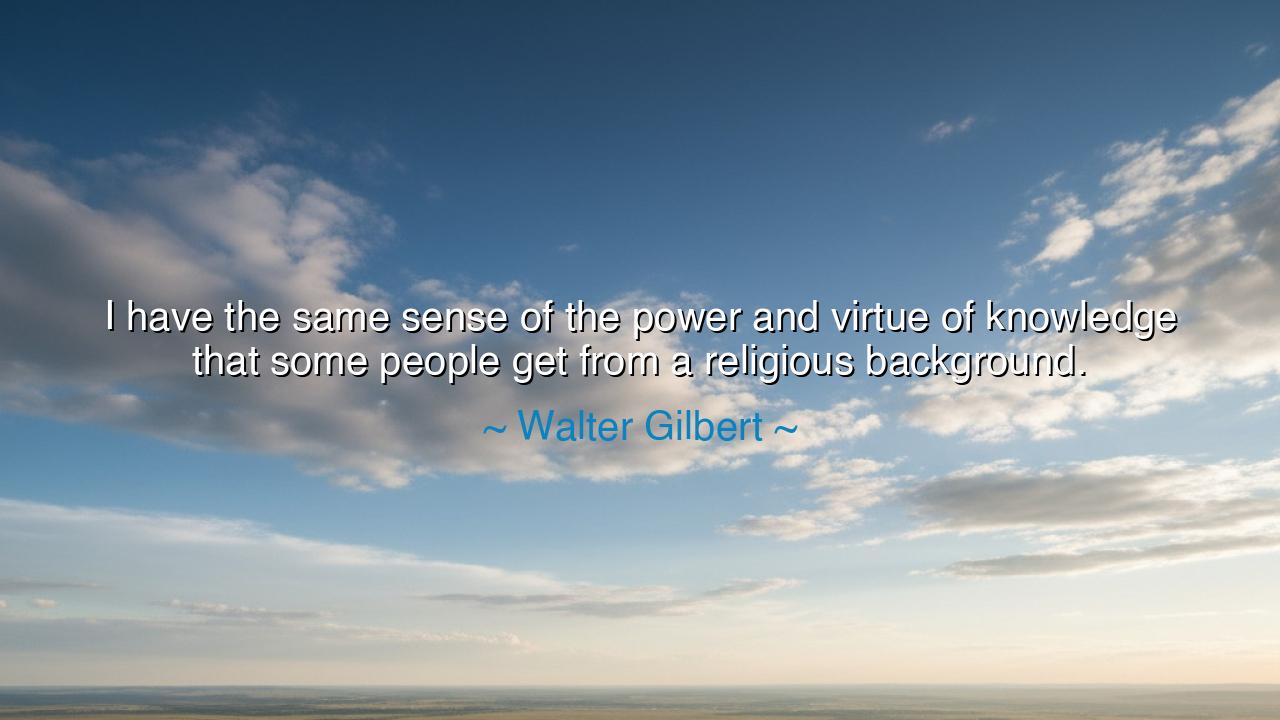
I have the same sense of the power and virtue of knowledge that
I have the same sense of the power and virtue of knowledge that some people get from a religious background.






“I have the same sense of the power and virtue of knowledge that some people get from a religious background.”
Thus spoke Walter Gilbert, Nobel laureate, scientist, and seeker of truth in the mysterious language of life. His words resonate with the depth of one who has gazed into the fabric of existence and found, within the silent order of nature, a sacred reverence akin to faith. In this declaration, Gilbert reveals not a denial of religion, but a transformation of it — a faith not in unseen divinities, but in the power and virtue of knowledge itself. To him, discovery is worship, and understanding is communion with the cosmos. His altar is the laboratory; his hymn, the unfolding truth of creation.
When Gilbert speaks of the “power and virtue of knowledge,” he touches upon two sacred dimensions of wisdom. Power — for knowledge grants the ability to shape, to heal, to transform the world. And virtue — for knowledge, rightly used, elevates the soul, deepens compassion, and brings harmony between man and nature. The unwise may see knowledge as mere weapon or tool, but to Gilbert, it is sacred light — the same light that faith offers to the devout. Just as the religious mind seeks revelation from heaven, the scientific mind seeks revelation from reality, for both are journeys toward the infinite. The man of science kneels not before a god of fire or thunder, but before the vast mystery of truth itself, humbled by its immensity and inspired by its beauty.
The origin of this quote lies in Gilbert’s own life, devoted to unraveling the secrets of DNA, the code that shapes all living things. As a pioneer of molecular biology, he worked to understand the script written into every cell — the wordless hymn of life that predates all languages. In decoding this hidden order, Gilbert and his peers revealed the astonishing unity of existence: that every creature, from the smallest microbe to humankind, is woven from the same thread of being. For him, this realization was not merely technical but spiritual — a revelation that filled him with awe and reverence. It was here that his faith in knowledge was born — a faith not of blind belief, but of enlightened wonder.
His sentiment recalls the spirit of Albert Einstein, who once said that the most beautiful thing we can experience is the mysterious. Einstein, too, spoke of a “cosmic religious feeling” — a sense of the sacred found not in ritual, but in the rational harmony of the universe. For both men, knowledge was not cold calculation but living illumination. It stirred in them the same awe that prophets once felt upon glimpsing the divine. To uncover a law of nature was, in their eyes, to read a verse of the eternal scripture written into the stars, the seas, and the soul. Their science did not destroy meaning — it revealed it, in ever-deeper layers of truth.
Yet Gilbert’s declaration carries another, subtler truth: that faith and knowledge are not enemies, but two expressions of the same human longing. The believer and the scientist both seek meaning; they both yearn to transcend ignorance and chaos. Where one prays, the other experiments; where one meditates on divinity, the other contemplates order. The danger lies not in their differences, but in forgetting that both require humility. The wise scientist, like the true mystic, knows that the more one learns, the greater the mystery grows. For every discovery opens not an end, but a thousand new questions — a reminder that the pursuit of knowledge is an infinite pilgrimage, not a conquest.
To embody the virtue of knowledge, then, is to balance wonder with wisdom, curiosity with conscience. The scientist who studies without humility may wield power without compassion, and thus destroy what he seeks to understand. But the one who learns in reverence — who treats knowledge as sacred — becomes a guardian, not a tyrant, of truth. History offers many examples: from the healers of ancient Greece who studied medicine as an act of devotion, to the modern physicists who wrestle with moral responsibility in the age of atomic power. Each stands before the same choice — to use knowledge as light or as fire.
Therefore, O seeker of wisdom, take this teaching into your heart: let knowledge be your faith, but let reverence be its companion. Learn not to dominate, but to understand; not to boast, but to serve. Let every discovery awaken in you gratitude for the vastness of what remains unknown. For the true sage does not stand apart from the universe but stands within it, his mind and spirit aligned with its order. To know is to draw nearer to the divine — not by prayer alone, but by perception, patience, and awe.
For as Walter Gilbert reminds us, knowledge has its own holiness — a power and virtue that lifts the soul as prayer lifts the heart. Those who dedicate themselves to learning, not for pride but for truth, become the new stewards of wonder in an age of reason. And when they kindle the light of understanding, they perform an act of worship no less sacred than any prayer — for in that light, they glimpse eternity itself.






AAdministratorAdministrator
Welcome, honored guests. Please leave a comment, we will respond soon